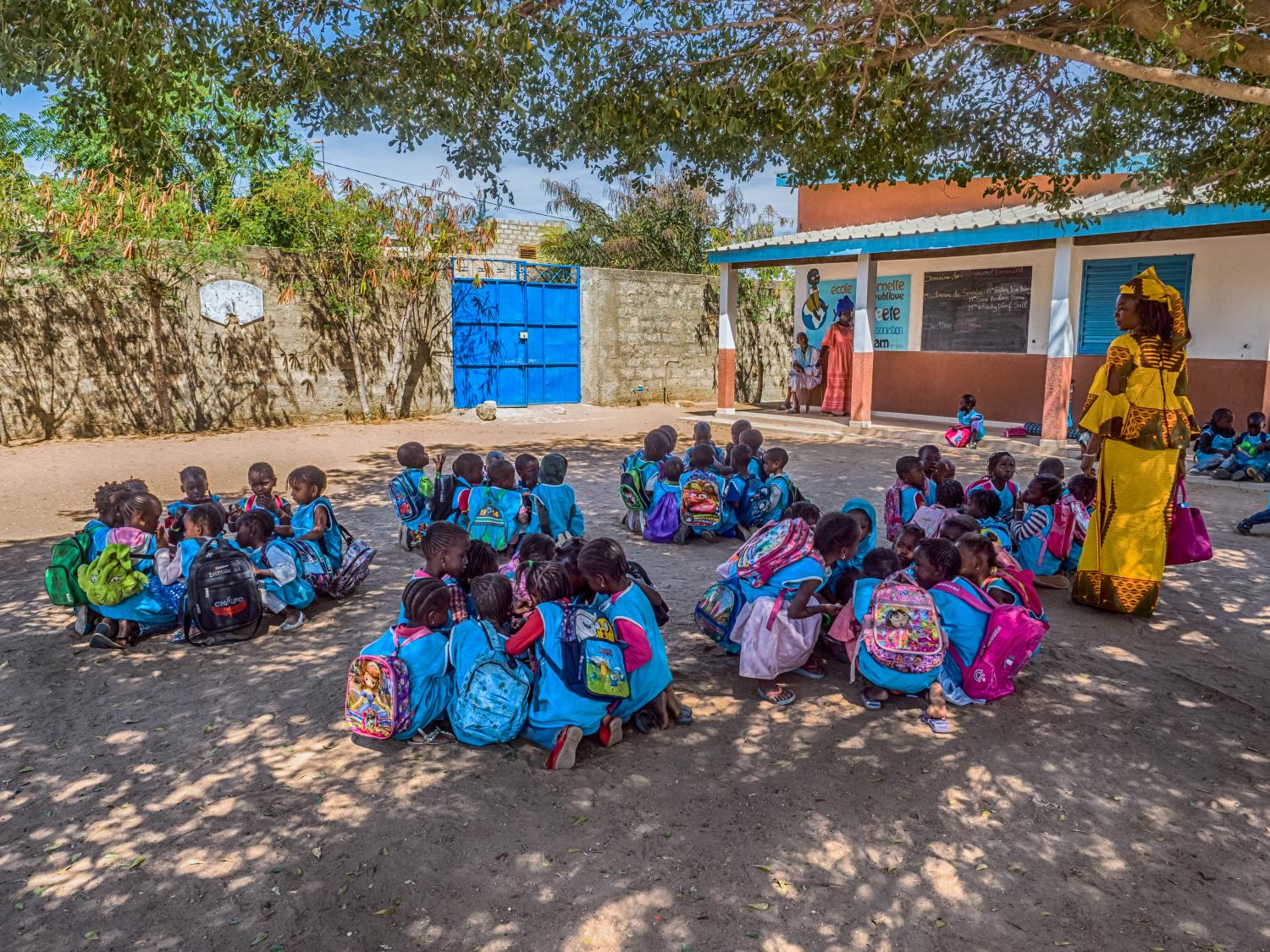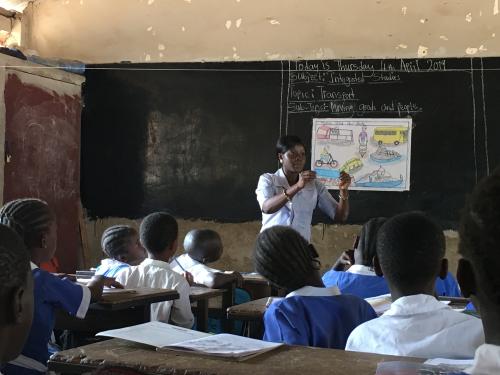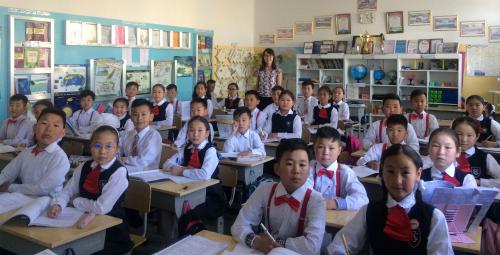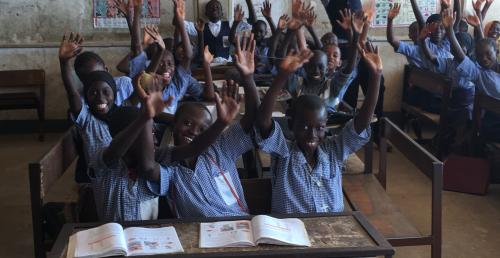This study is cross-posted with UNESCO.
In this publication, examples of classroom and national assessment tools used in nine sub-Saharan African countries are explored to identify if “21st century skills”1 such as collaboration, communication, problem-solving and critical thinking are demonstrated. The focus is on those skills that appear to be teachable and learnable in the formal education sector and prepare students for lifelong learning.
For this study, participants from Chad, Côte de d’Ivoire, Democratic Republic of Congo (DRC), The Gambia, Kenya, Lesotho, Mali, Senegal, and Zambia collected assessment tools from their national and classroom assessment resources from August to December 2018. Their collection goal was to identify tools across grades 3-8 that had the capacity to assess 21st century skills. In general, findings indicate that, of the tools collected, a majority did not directly assess these skills, but some were identified as clearly having the potential to do so. Issues highlighted by the study concern the limited test formats that are used for assessment generally, and lack of attention to more complex approaches to scoring and evaluation. These issues are common to many countries and may be attributed to low levels of assessment literacy among educators—typically, assessment is not a major part of preservice teacher education courses in many countries, nor is it an expertise among middle-level administrators or policymakers. Expertise tends to be confined to specialist assessment units. Easily scored tests that target knowledge constitute the majority of assessment tools, with the results contributing primarily to summative reporting of knowledge-based achievement.
An encouraging outcome of the study was that country participants saw the potential of adapting some tools to assess 21st century skills, which demonstrates that knowledge about the nature of these skills can prepare educators to better understand and address assessment needs concomitant with the introduction of 21st century skills into learning goals. The guidelines for data collection stipulated that the country researchers collect examples of assessment tools that directly or indirectly capture 21st century skills—in fact, there were no tools that directly captured the skills (i.e., no tools were deliberately designed for the purposes of assessing 21st century skills). The participants identified a range of tools that sampled student achievement in subject studies. In some of these, they identified clear potential for the tools to be used in a modified form for sampling 21st century skills proficiencies. This potential existed primarily in the content of the test items themselves, rather than in their scoring or reporting accessories.
From policy documentation provided by the country participants, in association with their collection of assessment tools, several factors were identified that appear to impact the early stages of implementation of 21st century skills learning goals as symptomatized through assessment and teaching; these factors are similar to those identified in previous studies (Care & Luo, 2016). They include lack of understanding of the nature of the actual learning and teaching that is implied by the learning goals; existing learning goals around which education systems are currently structured; lack of assessment, teaching resources, and professional development; and a misalignment of goals with the current curriculum, assessment, and teaching approaches. These issues are explored through brief discussion of the education context in three of the participating countries—Senegal, The Gambia, and Chad—and how the learnings from the study are informing strategy.
This is the first study to identify baseline information about the existence of 21st century skill assessments in Africa. The research, analyses, and engagement undertaken by the participants have provided a new perspective on how we can undertake assessment of these skills. Rather than assuming that such assessment requires radically different strategies, this study demonstrated how to use the known to advance into unchartered territories. Changing assessments to align with new learning goals does not mean abandoning what already exists. It can instead be achieved through adaptivity, creativeness, and flexibility. Teachers must also develop and demonstrate these skills in order to increase students’ skills development to a greater degree.
Learnings from the study
The study highlights several issues which reflect challenges faced in the assessment of 21st century skills.
- Test formats that are easy to score are used most frequently. More than half of the tools provided were scored dichotomously (i.e., correct-incorrect). While common across many assessment programs due to the efficiency and objectivity of this type of scoring, dichotomous scoring limits the variety of responses that can be elicited and disregards a large amount of information. In particular, such formats restrict the capacity to assess levels of competency in the exercise of 21st century skills. This is a major challenge that has been discussed by the authors in an earlier publication (see Care, Kim et al., 2019).
- There is a lack of rubric development and use. The summary results show that where country-provided tools are designed to capture more detail, we most commonly find open-format items that are scored using rating scales. Although rating scales can enable more than a correct-incorrect classification of student responses, subjectivity of ratings can impact the reliability of information. Depending on the nature of the rating scales, they may not guarantee substantial improvement over dichotomous scores. Where open-ended tools were collected, rubrics for the scoring of these were not made available—it is unclear whether these exist. For the capture of complex cognitive and social processes, well-defined rubrics are essential.
- There is potential for many of the tools that were not originally designed to capture 21st century skills to be expanded. A majority of provided tools were designed to measure knowledge of the core domains in which 21st century skills might be embedded, rather than 21st century skills themselves. The good news is the potential of the tools for expansion. For example, closed items which are scored dichotomously can be converted into an open format that is more flexible in terms of responses that can be elicited. Also, items that were identified as capturing only a single skill were found to have potential to tap into multiple skills during the verification process. However, in order to take advantage of such opportunities, capacity development in assessment (at both national and classroom levels) needs to take place.
-
Footnotes
- Other terminologies have been used to refer to 21st century skills, such as life skills, social emotional skills, transferable skills, and soft skills, etc.
The Brookings Institution is committed to quality, independence, and impact.
We are supported by a diverse array of funders. In line with our values and policies, each Brookings publication represents the sole views of its author(s).








